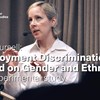empower
Disease prioritarianism: A Flawed Principle
Medicine, Health Care and Philosophy, May 2015. DOI 10.1007/s11019-015-9649-2 Disease prioritarianism is a principle that is often implicitly or explicitly employed in the realm of healthcare prioritiz
The Reverse Gender Gap in Ethnic Discrimination: Employer Stereotypes of Men and Women with Arabic Names
International Migration Review, s. 1-28. DOI: 10.1111/imre.12170 Abstract We examine differences in the intensity of employer stereotypes of men and women with Arabic names in Sweden by testing how much
The Importance of Age for the Reallocation of Labor: Evidence from Swedish Linked Employer-Employee Data 1986-2002
Using employer-employee data covering the whole Swedish economy from 1986 to 2002, this paper examines how job- and worker flows have been distributed across age groups. It finds that the flows vary b
The Importance of Education for the Reallocation of Labor. Evidence from Swedish Linked Employer-Employee data 1986-2002
The paper examines how job- and worker flows have been distributed both on an aggregate level and across educational levels using employer-employee data covering the whole Swedish economy from 1986 to
Does employer discrimination contribute to the subordinate labor market inclusion of individuals of a foreign background?
Social Science Research, vol. 98 Abstract Advanced labor markets are typically stratified by origin with a majority ethnic group occupying more desirable (high-skilled) positions and subordinated ethnic choices reinforce these patterns. This would be the case if employers were more reluctant to hire subordinate minority job applicants for high-skilled positions than for low-skilled occupations. We use experimental correspondence audit data derived from 6407 job applications sent to job openings in the Swedish labor market, where the ‘foreignness’ of the job applicants has been randomly assigned to otherwise equally merited job applications. We find that negative discrimination of job applicants with ‘foreign’ names is very similar in the high-skilled and low-skilled segments of the labor market. There is no significant relative ethnic difference in chances of callbacks by skill level. Because baseline callback rates are higher in high-skilled occupations, discrimination however translates into a significantly larger percentage unit callback difference between ‘natives’ and ‘foreigners’ in these occupations, in particular between male job applicants. That is, the
Is Early Retirement Encourage by the Employer? Labor-Demand Effects of Age-Related Collective Fees
The objective of this paper is to examine how employers’ non-wage costs for their workforce affect voluntary early retirement, using the case of the Swedish private sector. The results show that a 1 p
Completed: Ethnic discrimination in a segmented labor market – when and where does discrimination occur?
Within which occupations is discrimination of applicants by ethnicity more common? We examine differences in discrimination and seek knowledge about what mechanisms lie behind this.
Moa Bursell: Employment Discrimination Based on Gender and Ethnicity - An Experimental Study
Venue:Institutet för framtidsstudier, Holländargatan 13, 4th floor, Stockholm, or online.Research seminar with Moa Bursell, Associate Professor of Sociology and research leader at the Institute for Fu

Employment Discrimination Based on Gender and Ethnicity
The study contributes to knowledge about the process behind gender segregation in the labor market. Segregation may be seen as generated by the combined outcome of decisions located at the supply side
Democratic Legitimacy, Institutions for Future Generations and the Problem of Constitutional Power
Chapter in Hélène Ruiz Valérie Rosoux Alessandra Donati (red.), Representing the Absent, Baden-Baden: Nomos Verlag. Find the full book here > Abstract Recognising widely held concerns regarding ‘presentchapter challenges the contention that democratic legitimacy inexorably requires the inclusion of futuregenerations in democratic decisions. According to two requirements of democratic legitimacy – inclusionand constitutional empowerment – people should be empowered to participate in decisions about policyand law, and to determine the rules structuring the political framework. Drawing a distinction betweenthese requirements, this chapter contends that though it may be feasible to ‘include’ future generations forproxy representation, future generations cannot enjoy ‘constitutional power’.








